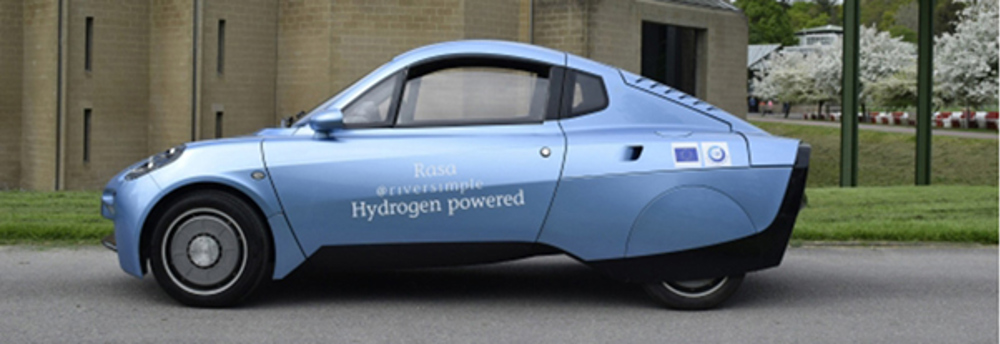
Is Hydrogen the Future of Motoring?
04 December 2023
Could hydrogen be the car fuel of the future? National Motor Museum Volunteer Seth Burgess explores an alternative to the petrol or electric.
Throughout the story of motor vehicles there have always been those who tried to be different. For example, in the Motopia collection was a hydrogen car prototype from 2015, the Riversimple Rasa Alpha. This car has a hydrogen cell that powers the car instead of batteries.
Whilst it is fair to say that electric vehicle batteries are taking the world by storm, is it too premature to suggest they are in fact the future? There is an argument to be made that the batteries are a quick fix. That instead, a better long-term investment lies with hydrogen. With an increasing amount of batteries being made, their faults are beginning to rise to the surface. The main source of concern lies in materials used in the batteries, most notably the acquisition of cobalt and nickel. Another problem with the batteries is their weight, which makes them virtually impossible to use in freight and aviation alike.

So, why hydrogen? For almost half a century since the General Motors Electrovan concept, car manufacturers have promised an eco-friendly, practical hydrogen car with still nothing to show for it. Even right now, hydrogen is not without its faults, the limited availability of pumps and the current price of an average tank of hydrogen puts it behind the battery powered EVs by some margin. Whilst hydrogen remains a fairly impractical fuel source today with 12 pumps in the UK alone. It is believed by some that once we have gotten over the hump of cracking hydrogen from water, it will make it an almost unlimited fuel source. When this leap has been made, this will not only provide a solution for all kinds of vehicles, but factories and housing as well by using the existing national gas network. Upon that achievement hydrogen pumps would be more widely available than any charging station, taking no longer to fill a tank than any petrol car with the only emission being water.
I am of the opinion that between the two I would likely go for a hydrogen-based car. That is, in a couple of decades. The fact of the matter is, as a long-term investment, we will not be seeing positives in hydrogen cars compared to EVs. Who is to say EVs will not improve tenfold in that time? I might be an outlier in my generation but if I had to go any which way right now, I would still be inclined to stay with combustion. As someone who loves motorsport and by extension super cars, the noise, the smell, and the enjoyment of driving manual cars. Electric cars do not really appeal to me in the same way they might to others. Out of sheer optimism I keep my fingers crossed that carbon neutral synthetic fuel will be a reality not too far off in the future.
The current manufacturers leading the hydrogen charge are Toyota, Daimler and Hyundai. Will hydrogen be wise investment, or is there another fuel that will prove to be better?
Seth Burgess

Seth is an university history student at Bournemouth. In 2023 he volunteered at Beaulieu, helping with various collections and getting an understanding of how a museum works. This is one of several blog posts to help introduce the Motopia? Past Future Visions exhibition.

Subscribe for updates
Get our latest news and events straight to your inbox.